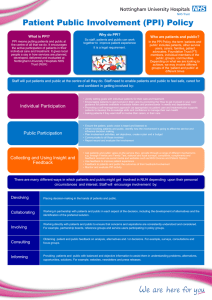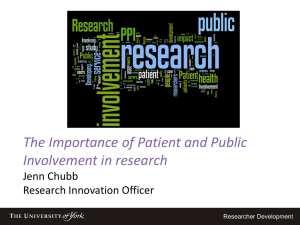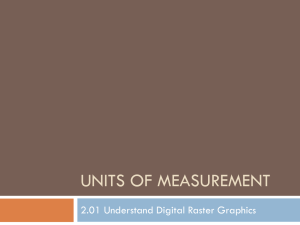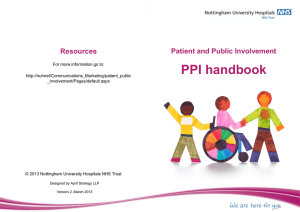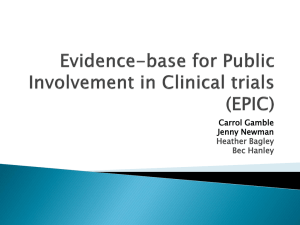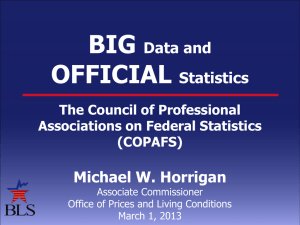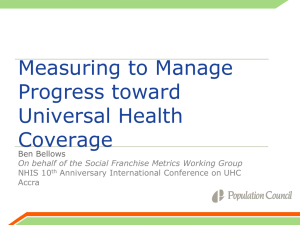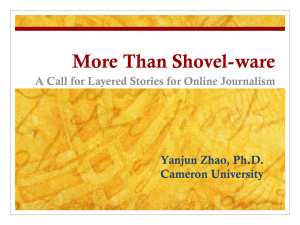How public involvement work is valued by Chief Investigators
advertisement
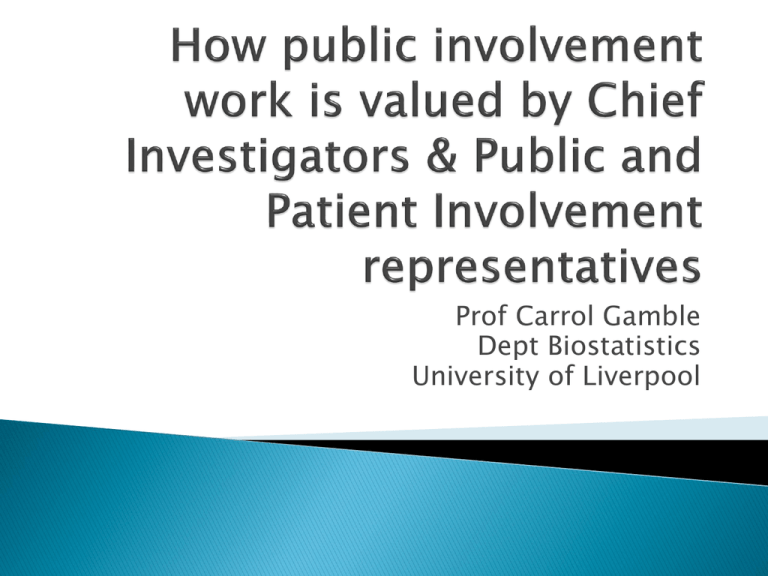
Prof Carrol Gamble Dept Biostatistics University of Liverpool Qualitative team Clinical trials team &/or quantitative analysis Professional PPI representatives Patient and Public Advisory Group ◦ Prof Bridget Young ◦ Louise Dudley ◦ Deborah Buck ◦ Carrol Gamble ◦ Paula Williamson ◦ Barbara Arch ◦ Jennifer Preston ◦ Bec Hanley ◦ Heather Bagley ◦ ◦ ◦ ◦ ◦ Alison Allam Philip Bell Heather Goodare Alison Walker Neil Formstone Jointly funded by NIHR HS&DR and INVOLVE Aims : To increase knowledge of PPI within RCTs ◦ Systematically describe and critically evaluate the process and impact of PPI from the perspectives of the PPI representative(s) chief investigator clinical trials unit (CTU) staff ◦ To analyse features of RCTs and the processes of PPI associated with PPI impact To provide an evidence base to inform the optimisation of PPI To really understand how to optimise PPI we need to understand current PPI processes to determine whether there is overall impact. Establish empirical evidence on how PPI was actually implemented in its broadest form. A systematic investigation of a cohort of Health Technology Assessment funded clinical trials. 1. Cohort examination of planned PPI in trials funded by the Health Technology Assessment (HTA) (2006-2010) as described within applications for funding 2. Questionnaire Survey (CI, PPI)- opinions & what actually happened 3. Interviews- purposive sample 4. Examining the existing role and future role of RCTUs in identifying and supporting PPI needs Phase 1: Cohort examination of planned PPI in trials funded by the Health Technology Assessment (HTA) Systematically review PPI as it is described in RCT applications funded by the HTA. Determine whether peer reviewers of HTA applications comment on proposed PPI by examining reviewers’ and Board comments and subsequent responses. Extract data from 111 HTA funded applications between 2006-2010 ◦ PPI and trial descriptors Approx 50% consider PPI within the early stages of the development of the research, Only a 25% described PPI within the development of the 1st stage application itself Evidence of risk-based approach ◦ particular conditions, and design considerations, impact on whether PPI is likely to be considered within the early stages of development Insufficient consideration of PPI at the early stages by funding Boards Survey of Chief Investigators & PPI representatives ◦ Opinions ◦ Methods of engagement ◦ Views on the areas of the trial that PPI impacted upon Subject to change In general what is your personal view on patient and public involvement (PPI),irrespective of funding requirements? PPI should always be incorporated in a research study PPI can be beneficial but is not always necessary I am not convinced of the benefits of PPI In general what is your personal view on patient and public involvement (PPI),irrespective of funding requirements? PPI should always be incorporated in a research study 52% PPI can be beneficial but is not always necessary 43% I am not convinced of the benefits of PPI 5% During the preparation of your grant application, when did you consider PPI? Immediately - before contact with the 53% When prompted by the clinical trials unit (if involved) 10% When I read the relevant questions on the funding application form 11% clinical trials unit (if involved) Cannot remember when I considered PPI 9% Did not consider PPI as far as I can remember 4% Other 14% Did you include PPI at any stage of the trial (from design to dissemination)? Yes No What motivated you to include PPI? It is the right thing to do Previous experience of the benefits Requirement of funding PPI rep offered their help Other Did you include PPI at any stage of the trial (from design to dissemination)? Yes No 94% 6% What motivated you to include PPI? It is the right thing to do Previous experience of the benefits Requirement of funding PPI rep offered their help Other 67% 59% 50% 5% 13% Which PPI reps did you involve? Patient Carer Parent Charity member Medical staff Other Most common ways identified Charity Patient support groups & voluntary organisations Patient, parent, carer known to me Previous involvement in the trial Uncommon Advertising PPI Network leads NHS Patient Advisory Liaison 67% 59% 50% 5% 13% 29% 30% 22% 46% 25% 0% 3% 1% Did you provide a clear description to the PPI rep outlining role & expectations? Did you provide a clear description to the PPI rep outlining role & expectations? Yes 71% In what capacity was the PPI rep associated with trial? Co-applicant TSC Trial Management group DMC Separate PPI Advisory Group 26% 83% 30% 13% 20% Frequency of contact with PPI rep? Once a month Once every 6 months Once a year Less than once a year Other* * 16% 51% 1% 1% 29% often describing variability in frequency Do you feel training should be given to researchers to help them to support PPI reps? Yes 79% Stage of involvement Yes % n High % Moderate % Low % None % Trial set up 74 56 27 54 18 2 Trial conduct 82 62 15 44 39 3 Data analysis 7 5* 20 40 20 0 Dissemination 37 28 18 50 25 7 * 1 answered yes but did not complete impact question Designing/commenting on PIS Considering patient burden of participation Determining outcomes to be measured Considering visit schedules Contributing to the recruitment process Helping to pilot assessments Considering length and nature of follow-up Helping to develop research question Other 84% 80% 46% 43% 41% 38% 36% 27% 23% Trouble shooting recruitment issues Advertising to raise trial profile Actively involved in recruitment/ consent process Data collection Participant identification Other* * Meeting attendance e.g. TSC, TMG n=25 *revising documentation n=6 57% 27% 7% 7% 5% 53% Do you advertise to potential trial participants that PPI reps have contributed to the trial? Yes 22% As a result of your experience with PPI in this trial, would you want to include PPI again in future trials? Yes, but only if it was a requirement of funding Yes, if adequate resources are available Yes PPI makes a valuable contribution to the research process If it was considered appropriate, I don’t believe it is always necessary No Do you advertise to potential trial participants that PPI reps have contributed to the trial? Yes 22% As a result of your experience with PPI in this trial, would you want to include PPI again in future trials? Yes, but only if it was a requirement of funding Yes, if adequate resources are available Yes PPI makes a valuable contribution to the research process If it was considered appropriate, I don’t believe it is always necessary No 1% 4% 79% 13% 1% Have you contacted your PPI rep for this trial and asked them to contact us so they maybe sent information about taking part in EPIC? Yes 24% (n=19) Approaches to contact Chief Investigator CTUs Advertising NIHR HTA email to TSC chairs Number completed=31 respondents to 28 trials 28th February 2014 (provisional) Dissemination of EPIC results Key note presentations from other key PPI projects Target audience- all stakeholders ◦ Funders, trialists, CTU staff, PPI reps Funding Acknowledgement: This project was funded by the National Institute for Health Research HS&DR (project number 10/2001/29 ) Department of Health Disclaimer: The views and opinions expressed therein are those of the authors and do not necessarily reflect those of the HS&DR programme, NIHR, NHS or the Department of Health
